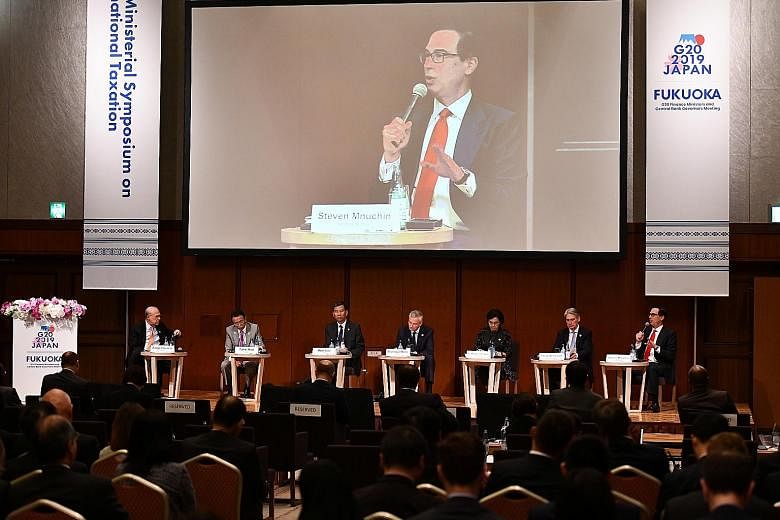FUKUOKA (Japan) • Group of 20 finance ministers agreed yesterday to compile common rules to close loopholes used by global tech giants such as Facebook to reduce their corporate taxes, a copy of the bloc's draft communique obtained by Reuters showed.
Facebook, Google, Amazon and other large technology firms face criticism for cutting their tax bills by booking profits in low-tax countries regardless of the location of the end customer, seen by many as unfair.
The new rules would mean higher tax burdens for large multinational firms, but would also make it harder for countries like Ireland to attract foreign direct investment with the promise of ultra-low corporate tax rates.
"We welcome the recent progress on addressing the tax challenges arising from digitisation and endorse the ambitious programme that consists of a two-pillar approach," the draft communique said. "We will redouble our efforts for a consensus-based solution with a final report by 2020."
Britain and France have been among the most vocal proponents of proposals to tax big tech companies that focus on making it more difficult to shift profits to low-tax jurisdictions, and to introduce a minimum corporate tax.
This has put the two countries at loggerheads with the United States, which has expressed concern that US Internet companies are being unfairly targeted in a broad push to update the global corporate tax code.
-
Singapore to tax overseas suppliers of digital services
-
Singapore will levy a tax on overseas suppliers of digital services from next year in order to keep pace with the growing digital economy.
The so-called "Netflix tax", announced in the 2018 Budget, will expand the goods and services tax (GST) to firms without a physical presence here.
The 7 per cent GST - which is set to rise to 9 per cent between 2021 and 2025 - will be collected from vendors that sell more than $100,000 in digital services to Singapore consumers and have a global turnover of over $1 million.
This means that content streaming services, software and mobile app downloads, for example, may get more expensive if firms pass the added costs on to consumers.
The Government has said the tax will level the playing field for local retailers, which are already subject to GST.
The tax is expected to bring in revenue of around $90 million a year.
Tiffany Fumiko Tay
"The United States has significant concerns with the two corporate taxes proposed by France and Britain," US Treasury Secretary Steven Mnuchin said yesterday at a two-day meeting of G-20 finance ministers in Fukuoka, Japan.
It sounded like there was a strong consensus on the goals of tax reform, he later said.
"So now we need to... deal with technicalities of how we turn this into an agreement."
Mr Mnuchin spoke at a panel on global taxation at the G-20 after the French and British finance ministers voiced sympathy with his concerns that new tax rules do not discriminate against particular firms.
Big Internet companies say they follow tax rules but have paid little tax in Europe, typically by channelling sales via countries such as Ireland and Luxembourg, which have light-touch tax regimes.
The G-20's debate on changes to the tax code focuses on two pillars that could be a double whammy for some companies.
The first pillar is dividing up the rights to tax a company where its goods or services are sold even if it does not have a physical presence in that country.
If companies are still able to find a way to book profits in low-tax or offshore havens, countries could then apply a global minimum tax rate to be agreed under the second pillar.
The path to a final agreement is still fraught with difficulty because of disagreement on a common definition of a digital business and on how to distribute tax authority among different countries.
After listening to presentations by French Finance Minister Bruno Le Maire and British Finance Minister Philip Hammond, Mr Mnuchin said yesterday that G-20 countries should issue "marching orders" to their respective finance ministries to negotiate the technical aspects of a deal.
Earlier this year, countries and territories agreed on a road map aimed at overhauling international tax rules that have been overtaken by the development of digital commerce.

